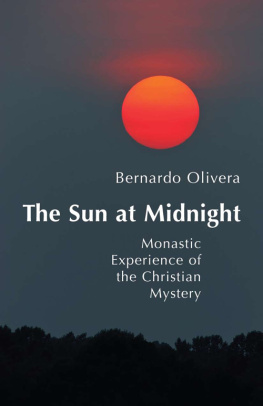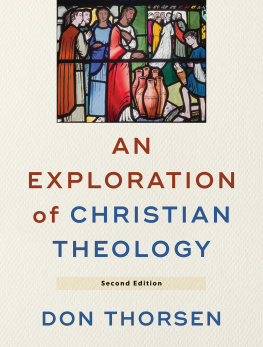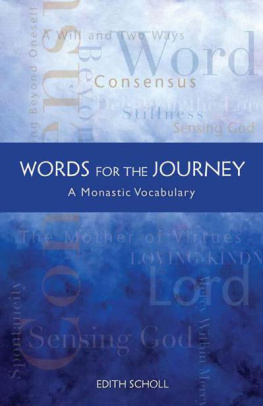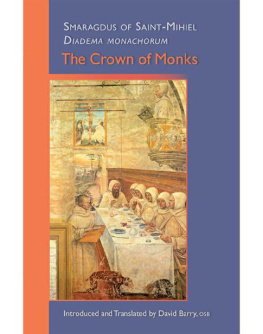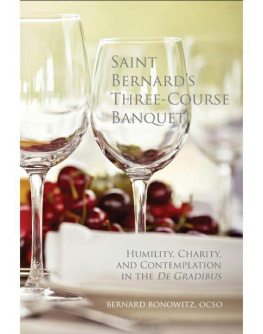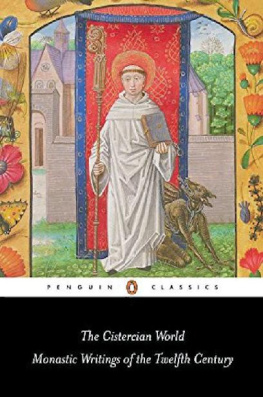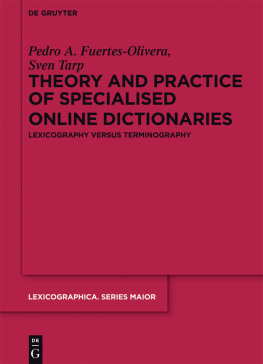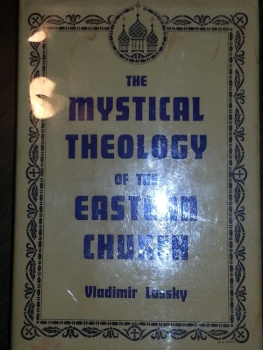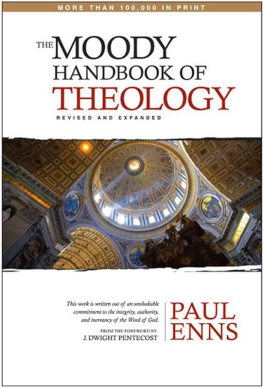MONASTIC WISDOM SERIES: NUMBER TWENTY-NINE
Bernardo Olivera, OCSO
The Sun at Midnight
Monastic Experience
of the
Christian Mystery
MONASTIC WISDOM SERIES
Simeon Leiva, OCSO, General Editor
Advisory Board
Michael Casey, OCSO | Terrence Kardong, OSB |
Lawrence S. Cunningham | Kathleen Norris |
Patrick Hart, OCSO | Miriam Pollard, OCSO |
Robert Heller | Bonnie Thurston |
MONASTIC WISDOM SERIES: NUMBER TWENTY-NINE
The Sun at Midnight
Monastic Experience
of the
Christian Mystery
By
Bernardo Olivera, OCSO
Translated by
Augustine Roberts, OCSO

Cistercian Publications
www.cistercianpublications.org
LITURGICAL PRESS
Collegeville, Minnesota
www.litpress.org
A Cistercian Publications title published by Liturgical Press
Cistercian Publications
Editorial Offices
Abbey of Gethsemani
3642 Monks Road
Trappist, Kentucky 40051
www.cistercianpublications.org
Excerpt from the English translation of Eucharistic Prayer III from The Roman Missal 2010, International Commission on English in the Liturgy Corporation. All rights reserved.
Scripture texts in this work are taken from the New Revised Standard Version Bible 1989, Division of Christian Education of the National Council of the Churches of Christ in the United States of America. Used by permission. All rights reserved.
Texts from the Psalms in this work are taken from the Grail Psalms, copyright 1963, The Grail, England
GIA Publications, Inc., exclusive North American agent
7404 S. Mason Ave., Chicago, IL 60638
www.giamusic.com
800.442.1358
All rights reserved. Used by permission.
Excerpts from the Rule of Benedict in this work are taken from Rule of Saint Benedict 1980 , edited by Timothy Fry 1981 by The Order of St. Benedict, Inc., Collegeville, MN. All rights reserved.
2012 by St. Joseph Abbey, Spencer, Massachusetts. Published by Order of Saint Benedict, Collegeville, Minnesota. All rights reserved. No part of this book may be reproduced in any form, by print, microfilm, microfiche, mechanical recording, photocopying, translation, or by any other means, known or yet unknown, for any purpose except brief quotations in reviews, without the previous written permission of Liturgical Press, Saint Johns Abbey, PO Box 7500, Collegeville, Minnesota 56321-7500. Printed in the United States of America.
| 1 | 2 | 3 | 4 | 5 | 6 | 7 | 8 | 9 |
 |
Library of Congress Cataloging-in-Publication Data
Olivera, Bernardo.
The sun at midnight: monastic experience of the Christian mystery / By Bernardo Olivera ; translated by Augustine Roberts.
p. cm. (Monastic wisdom series ; 29)
Includes bibliographical references.
ISBN 978-0-87907-029-8 ISBN 978-0-87907-477-7 (e-book)
1. Mysticism. 2. CisterciansSpiritual life. 3. Monastic and religious life. I. Roberts, Augustine, 1932 II. Title.
BV5082.3.O45 2012
255.12dc23
2012015410
Foreword
This new book by Dom Bernardo Olivera owes its paradoxical title, The Sun at Midnight , to the nature of mystical language. The title brings to mind the spectacular sight of the winter sky in the Far North, but midnight points, above all, to our human experience of searching amid shadows and darkness. Sun obviously refers to our longing for light. In the present case, it is a question of the supreme Sun, the dawn from on high, the Kyrios , the Risen Lord. Thanks to him, our human darkness and death have been mortally wounded by Life. In other words, the present book is based on Christian experience. Even more concretely, it concerns monastic experience.
Dont be afraid of this, however, in case you are not a monk or a practicing Christian. The author is convinced that there is a mystical presence in you, that you yourself are a mystic who perhaps is unaware of it. Mysticism is deeply human, a foundational experience not belonging exclusively to this or that religion, because it antedates them. Bernardo states this very clearly, insisting that it is more like human love itself, which is everyones heritage and is lived by many persons in the married state when they experience it as something transcendental, beyond the territory defined by confessions and creeds. So the subject of mysticism touches us all.
Paragraph 41 of Paul VIs Evangelii Nuntiandi contains a reflection first addressed to the members of the Council on the Laity on October 2, 1974: Modern man listens more willingly to witnesses than to teachers, and if he does listen to teachers, it is because they are witnesses. It is in this sense that I want to assure you that Bernardo is a good teacher whose depth of conviction points to his being a fervent witness. What he lives is the silent proclamation of what he is teaching.
Bernardo Olivera, born in Buenos Aires, Argentina, in 1943, was elected abbot general of the Reformed Cistercians, or Trappists (OCSO), on September 8, 1990. From that day until his resignation eighteen years later, we witnessed the almost excessive intensity of his service to the communities of our Order. One of the underlying themes of this service has been spiritual renewal according to the culture of a specific place and time. This, in turn, obliged the Order to look at the challenges that the world of today makes to our identity as believers and monks. When I say the world of today, I am thinking not of the difficulties that can come from outside but rather of those springing from inside ourselves, as children of our age.
Challenges of the World Today
These challenges that the world makes to our identity as Christians, and as monks and nuns, are in a particular way individualism, hyperactivity , and superficiality. Individualism eats into the quality of community life; hyperactivity undermines contemplative life; and superficiality weakens any commitment to serving the Lord.
Individualism means closing oneself in, believing oneself to be the center. Only Christ is the center of the community. It is he who calls us together, who makes it possible to have a common will, decentralizing us and thus despoiling us of our own will. The individualistic person is the one who is convinced that he or she is the necessary, irreplaceable center, as can happen even in the life of a superior.
Hyperactivity is much ado about nothing. One has to act, of course. Any commitmentand the contemplative life is onedemands that we give ourselves wholeheartedly to the task at hand. However, any other activity that does not help or flow from such commitments can be suspected of concealing a void that the person is desperate to fill. We know how busy everyone is. No one has time enough, everyone is in a hurry; but how do they fill their time?
Superficiality involves not sinking roots. Todays ease of movement and communication results in not having time to let our experiences ripen and our wine become mellow. That is why there is no time for deep roots to grow and become serious, stable commitments. But with deeper roots, it then becomes possible to face the storms, be up to date, stride into the future, and rejoice in ones own culture.
For Benedict of Nursia, the monastery is meant to be a human space, a little world, a context for lived experience. Values and convictions are communicated by a joyful, transparent osmosis, as any psychologist or sociologist can verify. However, to give oneself wholeheartedly to the Master in this school of the Lords service and to have the children really experience the love of their Father, there has to be a family home where the brothers live as sons and nothing is preferred to Christ in this school of Christ. This homey environment is community, which the Benedictine and Cistercian tradition has always looked on as a school of love transforming the monk or nun into the image of Christ.
Next page
